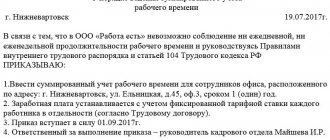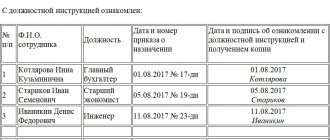For what reasons do job descriptions most often change?
This document is usually generated immediately after the registration of the enterprise for each position of the staffing table for an indefinite period. In the future, as practice shows, most often the job description undergoes changes for the following reasons: changes in the structure of the organization (reduction or increase in divisions and departments), reduction of personnel, redistribution of labor functions in order to optimize the work of employees. Also, adjustments to job descriptions may be required when amendments are made to legislation.
In what cases is an employee’s job description adjusted?
The type of local acts under consideration is not mandatory. Therefore, a job description (abbreviated as DI) is needed if the employer does not describe the employee’s functions in the contract, but devotes a separate document to this.
Also, a job description is mandatory if the manager refers to the employee’s mandatory adherence to it in the responsibilities section of the employment contract.
The work of the structural divisions of any company is subject to in-depth analysis by senior management. The functionality of professions and positions will also be no exception. Managers can make changes to employees' responsibilities to improve production efficiency.
Adjustments may occur:
- Due to enterprise reorganization, expansion or modernization of production.
- To comply with current legislation, professional standards or CEN.
- On the initiative of the head of the structural unit.
If the workload on an employee significantly increases or decreases, wages may change. Therefore, almost always a change in the DI entails the conclusion of an additional agreement.
Prepare additional an agreement will be required regardless of the nature of the amendments to the DI, if this document is drawn up as an annex to the employment contract.
It is also worth remembering that if the job description is adjusted due to reorganization, employees must be notified of this in writing no later than two months before the innovations come into force.
What is the order for?
You cannot simply change some lines in the job description of an employee of an enterprise. This is a rather serious procedure, which includes several stages, and the very first is the issuance of an order to make changes.
An order is an administrative act on the basis of which other company employees implement management instructions.
The absence of an order in the event of inspections of the organization’s activities by state supervisory authorities may lead to administrative punishment of the director and the legal entity itself.
When a person gets a job in a company, he gets acquainted with his job description against signature. It is often attached to the employment contract itself. Over time, by the will of the administration, the range of responsibilities assigned to the employee expands. And then a logical question arises for the employee: what to do if the employer unilaterally changed the job description? Here is one example from life.
I work at a company as a raw material purchasing manager. However, recently the administration has been trying to assign me the responsibility of maintaining accounting records of purchased products. To all my questions, management answers that the relevant obligations have recently been included in the job description in force at the enterprise. I understand that it is unlawful to require me to perform additional duties. What should I do in this case? Dmitry, Izhevsk.
Well, let's figure it out in order. Many enterprises have a document called a job description, which spells out all the main responsibilities of the employee. Having it, most companies do not indicate the employee’s functions in the employment contract, limiting themselves to only a reference to the job description.
And then the person learns that, without warning, the employer has unilaterally changed the scope of his responsibilities. This is immediately followed by the idea that such a step is illegal. To be objective, we will present arguments in favor of both the enterprise and the employee.
When can instructions be changed without the consent of the employee?
Today, there is such a point of view, supported by explanations from government bodies and judicial practice, that it is allowed to make changes to the job description regarding the expansion of functional responsibilities within a particular position without changing the labor function defined by the employment contract.
However, two main conditions must be met here. Firstly, changes cannot contradict the provisions of the ECTS (Unified Tariff and Qualification Directory of Work and Professions of Workers) regarding a particular position. Secondly, new functional responsibilities should not require additional education or qualifications from the employee.
In other cases, adjustments to the job description require the employee’s consent. After all, changing the range of job responsibilities is possible only by mutual expression of the will of the administration and the employee (as written in Article 72 of the Labor Code of the Russian Federation). Therefore, ideally, in order to change a job description, an enterprise is obliged to approve its new edition, which the employee reads again upon signature.
What should an employee do if the job description changes?
In the event of an unlawful unilateral change to a job description, the employee should proceed as follows. First, in the complaint form, you need to notify the company that the person does not agree with the additional responsibilities assigned to him, since they are not included in his specialty or qualifications. In addition, as a compromise, you can indicate in your appeal a demand for an increase in wages due to the increased workload.
If the administration takes extreme measures and no longer wants to keep the employee, the following algorithm for the employee to protect his rights comes into force. First of all, you need to prepare a complaint to the labor inspectorate with references to an unlawful change in production duties. In addition, a lawsuit should be initiated for reinstatement at work, compensation for earnings for being forced to stay at home, and compensation for material and moral damage.
A claim related to labor rights can be considered by the court either at the place of residence of the dismissed employee or in the area where the enterprise is located. There is no state fee for filing it. A copy of the work record book should be attached to the court materials. At the request of the employee, the court may request from the enterprise copies of orders for the hiring and dismissal of a person from work, as well as the old and new versions of the job description.
We talked about the general algorithm of possible actions if the employer changes the job description unilaterally. However, there are many legal subtleties that are difficult for an ordinary person to understand. Therefore, Legal’s lawyers are capable of resolving the situation that has arisen. They will be able to prepare both a claim to the employer and a statement of claim to the court .
To do this, just place your order in our online store. employee rights
Whose autographs should appear on the document?
Since all orders are issued on behalf of the director, he must be the first to sign this order.
In addition to him, the form must indicate all the persons to whom he is related, as well as those employees of the enterprise who are responsible for the execution of the order. It should be said that in some cases, employees of an organization can leave their autographs about familiarization not directly in the order itself, but in a separate act or statement (this is especially true in large companies with a large number of personnel).
A stamp in a document is not a strictly mandatory condition for its authenticity, but if there is an indication of its use in the company’s regulations, then the order should still be endorsed using a stamp.
Notification of changes to the terms of the employment contract determined by the parties
In accordance with Art. 56, 57 of the Labor Code of the Russian Federation, the subject of the employment contract includes:
- description of the employee’s job function;
- working conditions.
Since the content of the DI is not regulated, it may include information related to the employment contract in the above part. Changing its conditions is carried out in 2 ways:
- By agreement of the parties - as a general rule (Article 72 of the Labor Code of the Russian Federation). Therefore, it is advisable to formalize a change in the DI, which is part of the employment contract, in an additional agreement to it.
- At the initiative of the employer - in case of organizational and technological changes (Article 72 of the Labor Code of the Russian Federation) while maintaining the same labor function. In such a situation, you need to notify the employee 2 months in advance of the upcoming changes (a sample notification and some details of the changes can be found at the link: Notification of changes in the terms of the employment contract). If the terms of the employment contract do not change (for example, qualification requirements are adjusted), this requirement does not need to be observed.
Please note that the procedure for developing a new DI or its changes, agreeing and issuing an order to approve changes, the contents of this order do not have to be brought to the attention of the employee, since these procedures and documents do not affect his labor rights and do not relate to the information provided on the basis of clause 1 Art. 62 Labor Code of the Russian Federation.
The corresponding conclusion was made in the decision of the Zheleznogorsk City Court of the Krasnoyarsk Territory dated 02/01/2011 in case No. 2-215/2011. The subject of information and agreement, if necessary, is only the content of changes in the DI.
How to account and store
The order, as one of the main documents regulating the activities of the organization, is subject to certain accounting. To do this, information about it must be entered in a special accounting journal, where it is enough to make a note about the date of its issue and number. After this, the completed form and signed by all interested parties should be filed in the same place where other similar papers are already stored. Here it must be available for the period established by law or for the period prescribed in the accounting policy of the enterprise.
Sample order to amend a job description
If you need to make an order to make changes to a job description that you have not encountered before, study its sample and detailed analysis - with its help you will create the correct order without any problems.
- To begin, enter the name of the company into the document, then assign a number to the order, indicate the place and date of its creation.
- Next, form the main part. Here it is necessary to indicate the basis for drawing up the order (i.e., provide a link to the law or internal act of the company that is directly related to the document being created), as well as the justification (i.e., the real reason).
- Then enter the name of the position for which the functions are changing, and in order, enter in the order an indication of those items of the job description that are subject to amendment.
- Include a new version of each item, then mark the employee who will be responsible for the execution of this order.
- At the end, do not forget to take care of collecting signatures for the document.
Is it permissible to change a job description without the employee’s consent?
Due to the requirements of Art. 74 of the Labor Code of the Russian Federation, management has the right to change the requirements of job descriptions without the consent of employees if the following have changed:
- working conditions (for example, reorganization took place, new work modes were introduced);
- production technologies (for example, new equipment has appeared).
In addition to the fact that the employer introduces new working conditions, he must justify their necessity, since if employees contact regulatory authorities, they will be able to challenge the change in job responsibilities.
At the same time, the employer, according to Part 2 of Art. 74 of the Labor Code of the Russian Federation, is obliged to notify employees of upcoming changes 2 months in advance.
After the employer initiates changes to the instructions, the situation may develop in one of the following ways:
Subscribe to our newsletter
Read us on Yandex.Zen Read us on Telegram
- The employee agrees with the changes made and continues to work according to the new rules.
- The employee writes a refusal to continue working under the new conditions. In this case, the employer is obliged to offer an alternative vacancy (including a lower-ranking one). If the employee agrees, he continues to work in the new position; if he refuses, the contract is terminated on the basis of clause 7, part 1, art. 77 Labor Code of the Russian Federation.







